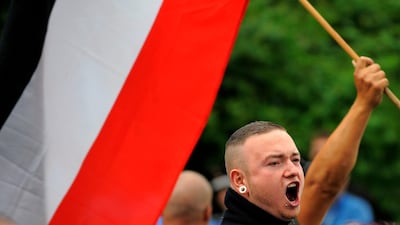Police in Germany have removed up to 200 black crosses put up by far-right activists.
It comes as the nation’s domestic intelligence agency (BfV) last week raised concerns about the rise of radical groups and designated the Identitarian Movement as an extreme right-wing organisation.
The security service estimates Germany is home to 24,100 far-right radicals - 12,700 of which it classes as posing a threat.
On Saturday, German Chancellor Angela Merkel renewed calls for opposition from all sections of German society against the resurgence of right-wing extremism as she honoured the Hitler coup plotters ahead of the 75th anniversary of their attempt to murder the Nazi dictator.
Police officers are investigating suspected incitement to racial hated after spray-painted wooden crosses commemorating German people allegedly killed by foreigners appeared on road sides across the east of the country.
The crosses allegedly mark the lives of Germans murdered by foreigners, with activists claiming thousands have been killed since 1990.
But officials say the figures are unfounded.
They have appeared every July since 2014 bearing xenophobic slogans.
Officials claim the far-right networks in the regions where the crosses have appeared are “well organised”.
Chancellor Merkel’s 2015 open-door migrant policy, which led to the arrival of more than 1 million people, led to a surge in support for anti-migrant groups including the far-right Alternative for Germany (AfD).
The designation of the Identitarian Movement follows the murder of German politician Walter Lubcke last month, prosecutors believe his death was politically motivated by those with links to neo-Nazi extremism due to his support for the Chancellor’s refugee policies.
The Identitarian Movement has not been directly linked to the killing, but the BfV intelligence agency said the group discriminated against non-Europeans and Muslims and as such was incompatible with the constitution.
The official classification makes it easier for the agency to monitor the group’s activities and members - of which it says there are 600 in Germany.
“These verbal fire-raisers question people’s equality and dignity, they speak of foreign infiltration, boost their own identity to denigrate others and stoke hostile feelings toward perceived enemies,” said BfV President Thomas Haldenwang.
The Identitarian Movement branded the BfV’s decision disproportionate and driven by political motives linked to anti-right wing hysteria.
“The intelligence agency is not warning about a real danger, but is constructing an extremist apparition and making itself a stooge of the left-wing establishment,” it said on its website
“Our actions are subversive and sometimes provocative. But under no circumstances are they anti-constitutional or extremist.”
On Saturday Chancellor Merkel said Germans have a “duty” to stand up to extremism as she paid tribute to those who opposed Nazi rule.
"They followed their conscience and thereby shaped a part of Germany's history that otherwise would have been solely defined by the darkness of National Socialism," she said.
"We, too, have a duty today to stand up against all those tendencies that want to destroy democracy.”
Friday will mark 75 years since the failed assassination attempt on Hitler in 1944.
The instigator, Claus Schenk Graf von Stauffenberg, and 200 co-conspirators were later executed.


